In Spite of Critics, Sweetwater’s Rattlesnake Roundup Draws Huge Crowds
By Samantha Eisenmenger
Reporting Texas
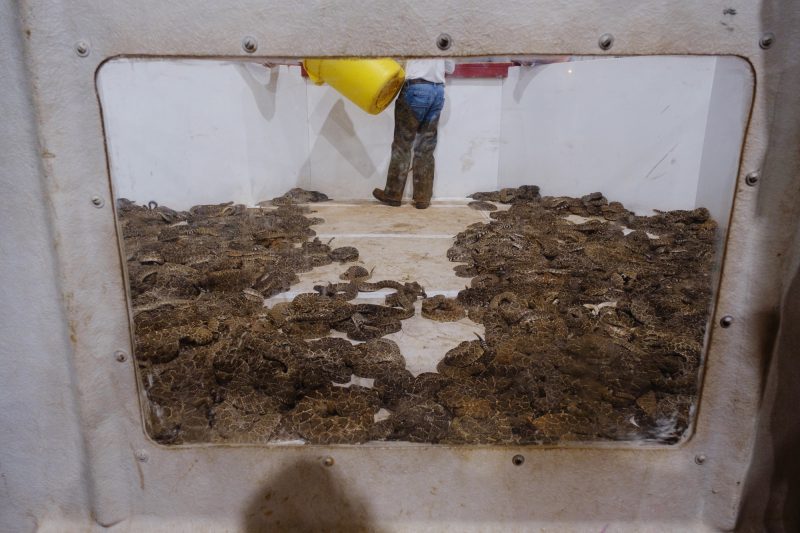
Rattlesnakes waiting to be skinned, are displayed in a special pit at the Sweetwater Rattlesnake Roundup on March 11, 2023. Although criticized for its treatment of snakes, the event continues to attract large crowds. Ry Olszewski/Reporting Texas
SWEETWATER — On a Saturday in March, two men hoisted a large yellow trash can over the wall of a snake pit in the Nolan County Coliseum. Rattlesnakes spilled from the can onto the floor, their bodies wriggling and tangled.
The men working inside the octagon-shaped pit pushed the snakes aside with their cowboy boots and a long metal pole. The hundreds of snakes coiled into a tight circle. Their rattlers vibrated loudly. They smelled of musk and halitosis.
Outside the coliseum, vendors sold snacks, Trump flags, cowboy hats and assorted knickknacks. Dozens of recreational vehicles were lined up near the coliseum, with many people participating in a rattlesnake cook-off with a $1500 cash prize.
The Sweetwater Rattlesnake Roundup, first held in 1958, began as a rattlesnake hunt with the goal of controlling the snake population in this small northwest Texas town. The event is now billed as the largest rattlesnake roundup in the world.
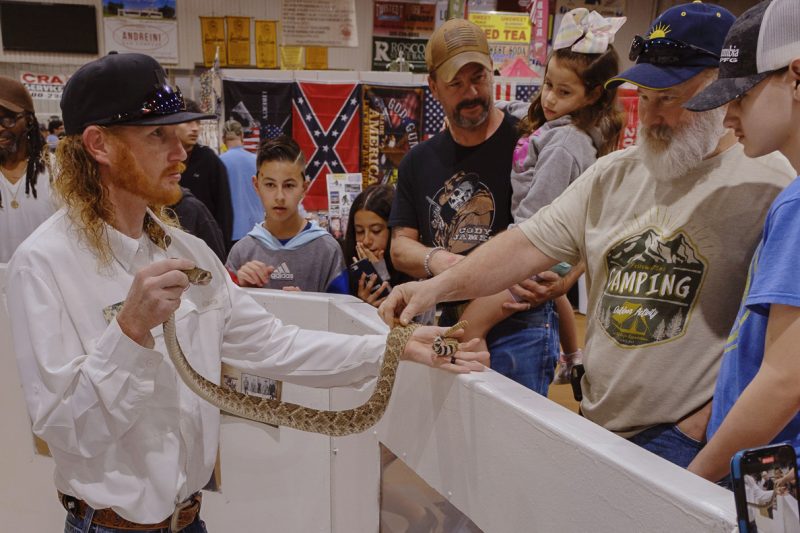
A Sweetwater Jaycee holds out a rattlesnake for festival goers to touch during the roundup, which is a very interactive event. Ry Olszewski/Reporting Texas
The roundup has grown from a small community event to a spectacle that attracts tens of thousands of attendees and provides the community a powerful economic boost, but an increasing number of animal welfare advocates say the roundup is cruel and unnecessary.
Clint “The Snake Man” Pustejovsky owns Texas Snakes, a Houston business that advocates for educating the public about the benefits of snakes. Pustejovsky describes himself as a conservationist, not an activist.
“I am vehemently opposed to rattlesnake roundups. They’re horrible, you would never do that to any other animal,” Pustejovsky said.
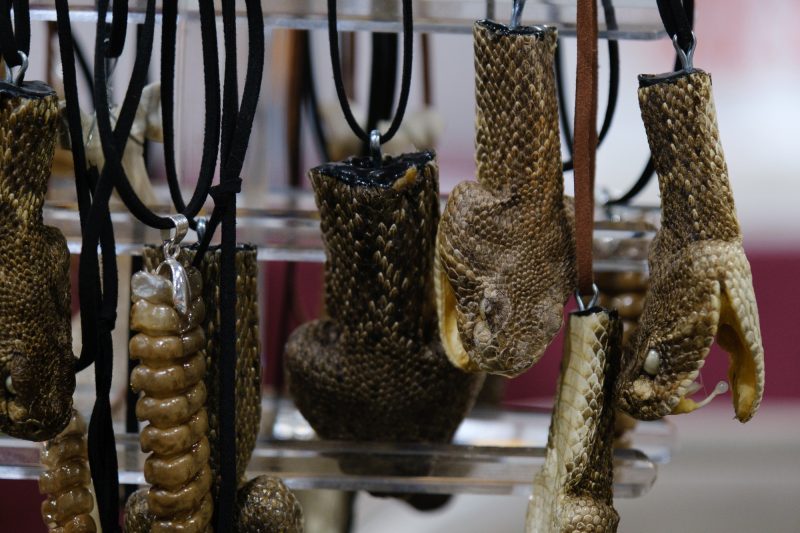
James Smith displays rattlesnake head necklaces he sells at his booth during the roundup. Ry Olszewski/Reporting Texas
Chris Soles, the public relations officer for the Sweetwater Jaycees, the civic organization that organizes the event, said the roundup has become an important part of the community, maintains the snake population and provides an economic boost for residents.
Soles said the roundup helps “keep the (rattlesnake) population in check.”
“People call all the time. ‘I got a snake in my house.’ ‘My dog got bit.’ Whatever, you know, and somebody gets bit. I mean, it’s a very, very expensive bill,” Soles said.
“You know, we get people all yelling ‘you’re killing that animal.’ Look, you got your opinion. Everybody’s got their opinion. We’re going to do what we got to do to support our community,” Soles said.
Economic impact
A couple of miles from the bustling coliseum, rows of weathered houses in various stages of disrepair line the streets. The asphalt roads are cracked and worn so thin it reveals the concrete below.
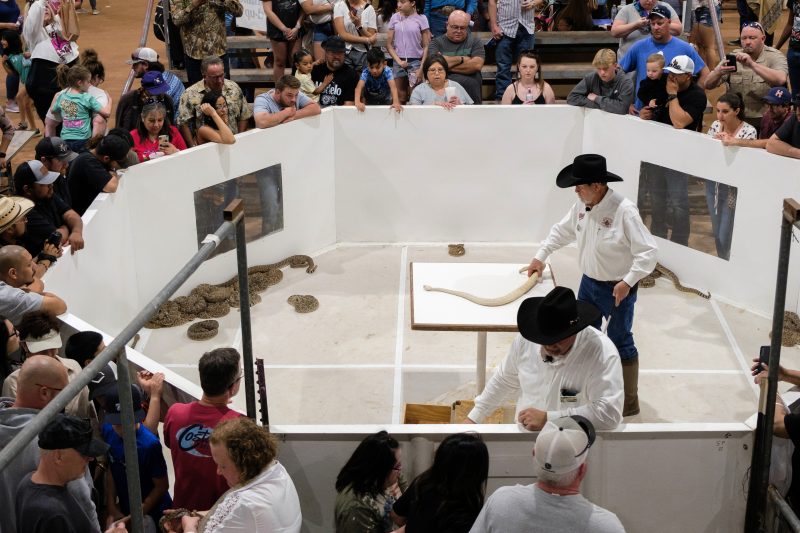
A Sweetwater Jaycee member conducts a snake handling safety demonstration for onlookers at the roundup. Ry Olszewski/Reporting Texas
Sweetwater, population 10,513, sits 40 miles west of Abilene in northwest Texas. Cotton, oil and cattle have traditionally powered the town’s economy, but during the last several decades, the area has fallen on hard economic times.
In 2021, Sweetwater’s poverty rate was 18.8%, according to the U.S. Census Bureau. The national rate was 11.6%.
The Rattlesnake Roundup provides a powerful economic boost for the area. Lodging, restaurants and retail shops benefit heavily during the four day festival.
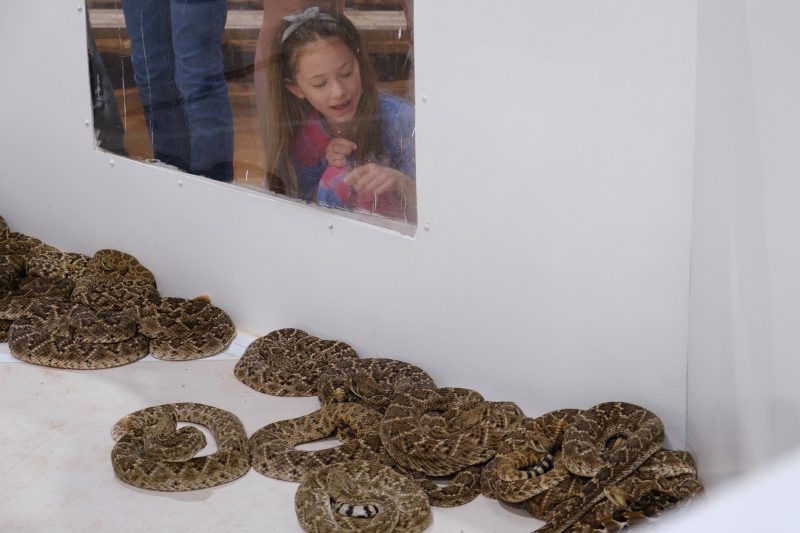
Finnian Lee, 10, looks at a pile of rattlesnakes in the snake handling demonstration pit at the roundup. Ry Olszewski/Reporting Texas
Over 25,000 people attended the Rattlesnake Roundup in 2015, resulting in an economic boost of nearly $8.4 million, according to the most recent economic impact study from the Sweetwater Chamber of Commerce.
“It is because of the roundup, and there’s no other reason for it, we have had three or four motels built out here. And that makes no sense, in a town our size, except for that,” Basye said.
Catching, beheading and skinning
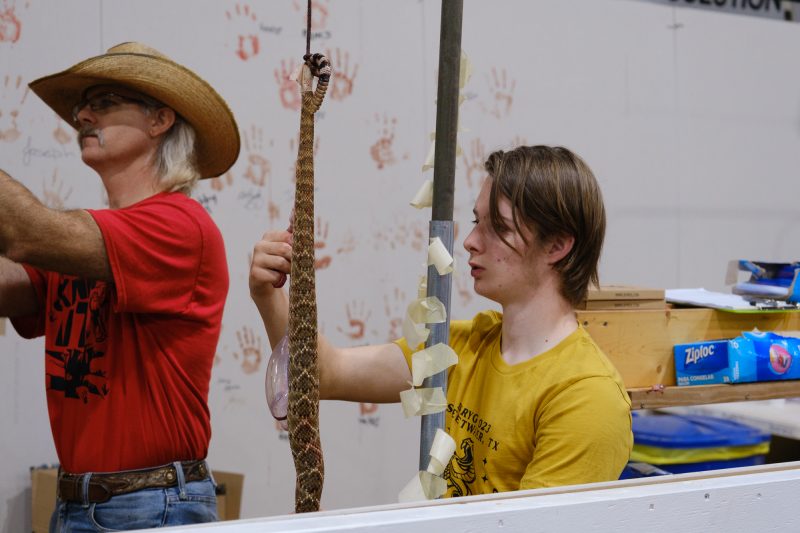
Erik Gouge, 17, right, guts and skins a snake in the skinning pit during the event. Nearly every part of the snake is used. Organs are made into supplements, skins are formed into key chains and other accessories, while the meat is fried and served all weekend. Ry Olszewski/Reporting Texas
Each year at the roundup, participants form teams and compete to see who can catch the most rattlesnakes. This year the winning teams caught 454 pounds of snakes.
James Smith manned the Randall’s Wildlife Creations booth during the roundup. Smith was hawking taxidermied rattlesnakes, belts, wallets and other wearable rattlesnake accessories. Smith has attended the roundup for 12 years, and purchases dead snakes to make his company products.
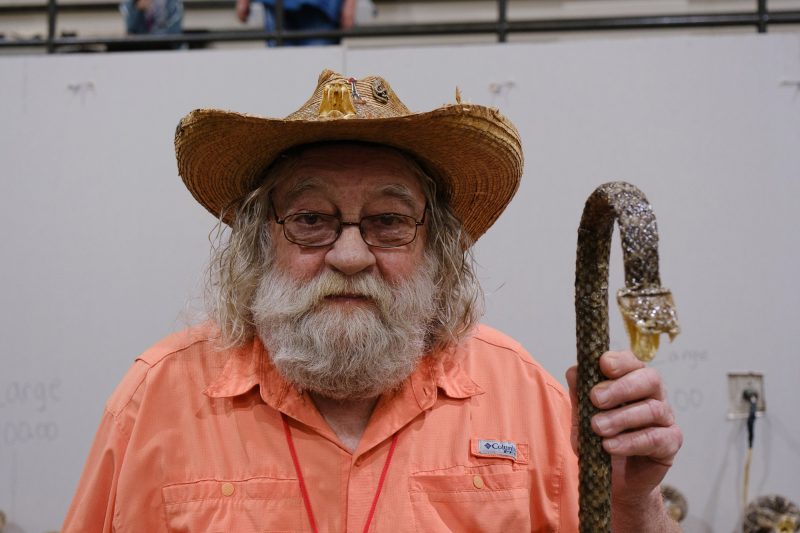
James Smith shows one of the many rattlesnake items he sells during the roundup. Ry Olszewski/Reporting Texas
“In 2016, here at this show, we bought almost 25,000 pounds. So that’s equivalent to a three-year supply of snakes for us. But then when the freeze came two years ago, it killed almost all of the snakes in Texas. Since the big freeze, we haven’t logged a thousand snakes a year,” Smith said.
The Jaycees reported a total of 2,595 pounds of rattlesnake for the 2023 roundup.
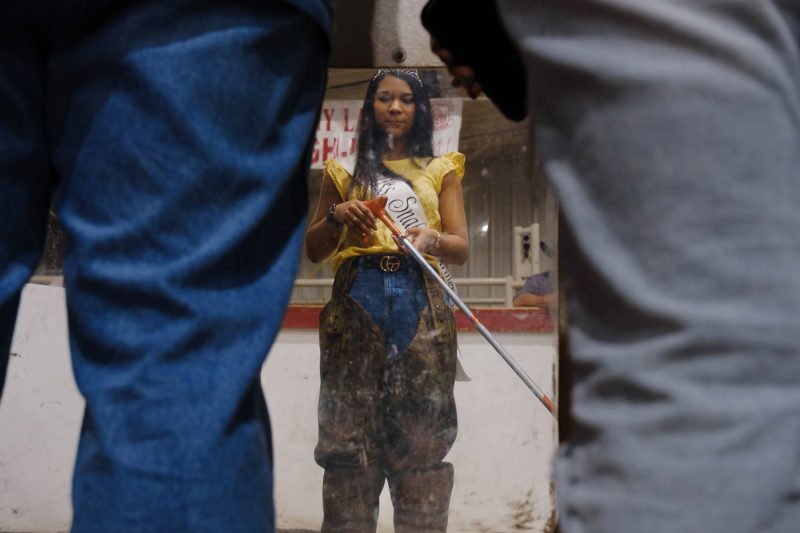
Trinity McGee, the roundup’s Miss Snake Charmer, stands in one of the pits of snakes. Ry Olszewski/Reporting Texas
Each year, the roundup holds a Miss Snake Charmer pageant. The winner, usually a high school student, beheads and skins a rattlesnake in front of the crowd. Once completed, Miss Snake Charmer makes a bloody handprint on the wall and signs their name.
Throughout the event, which starts on Thursday and ends on Sunday, volunteers behead snakes and hang them from a rope — their headless bodies still squirming — then skin them in front of an audience.
Pustejovsky says the spectacle is emblematic of the problem with snake roundups.
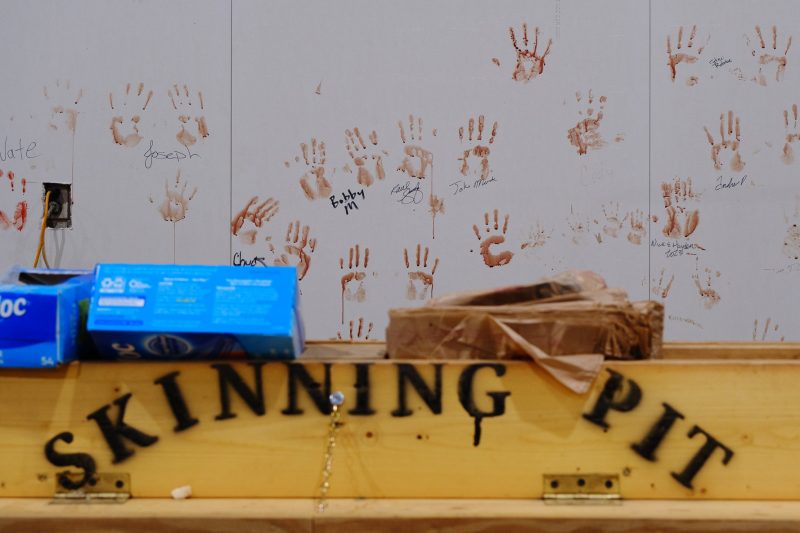
Bloody handprints made with the blood from dead snakes are displayed above the skinning pit. Ry Olszewski/Reporting Texas
“I think killing snakes in front of children and taking the blood from the snakes and putting the handprints on the wall. And all the things, theatrics they do to make it look like these are horrible animals, in front of audiences, is about as wrong as can be,” Pustejovsky said.
As snakes were skinned inside the coliseum, a group of animal welfare protestors gathered outside. They held signs with People for the Ethical Treatment of Animals emblems, but did not wish to identify themselves by name, according to KRBC-TV.
Ted Basye is the President of the Sweetwater Rifle and Pistol Club and a former Jaycee member, was dismissive of the protestors.
“We encourage them to put [rattlesnakes] in the backyard with their kids, and with their pets, and all that stuff, and they’ll see why we don’t want them here,” Basye added.
Guided hunt
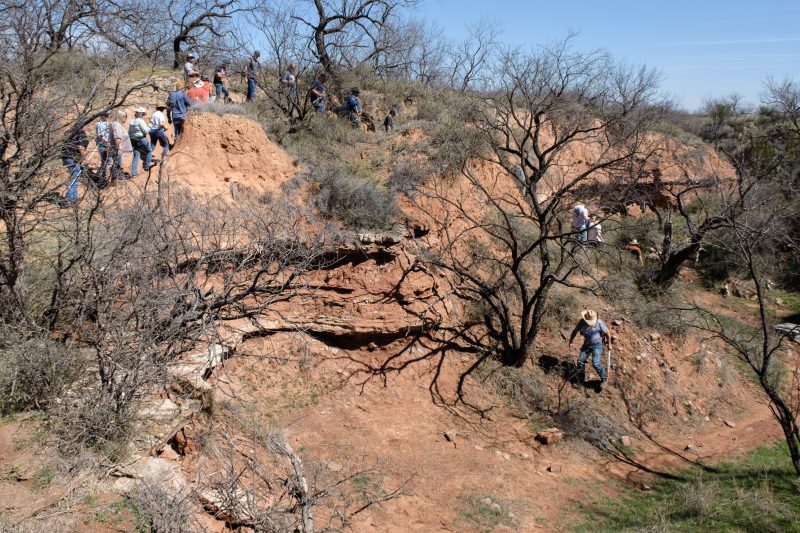
Hunters hike into a ravine to look for rattlesnakes on a guided hunt in Sweetwater. Rattlesnakes like to hide under overhangs and in crevices in the rock of the ravine, making it a popular hunting spot. Ry Olszewski/Reporting Texas
As part of the Roundup, attendees can pay $75 to participate in a guided rattlesnake hunt.
The 2023 hunt started at a Walmart parking lot in Sweetwater. Those who needed hunting permits bought them inside the store. Jaycee guides took a caravan of visitors to a ranch a few miles outside of Sweetwater. Once parked, people gathered around Jon Browning, a Jaycee guide, as he instructed the group to watch where they step.
“Snakes don’t fly, so don’t look at the sky,” Browning said.
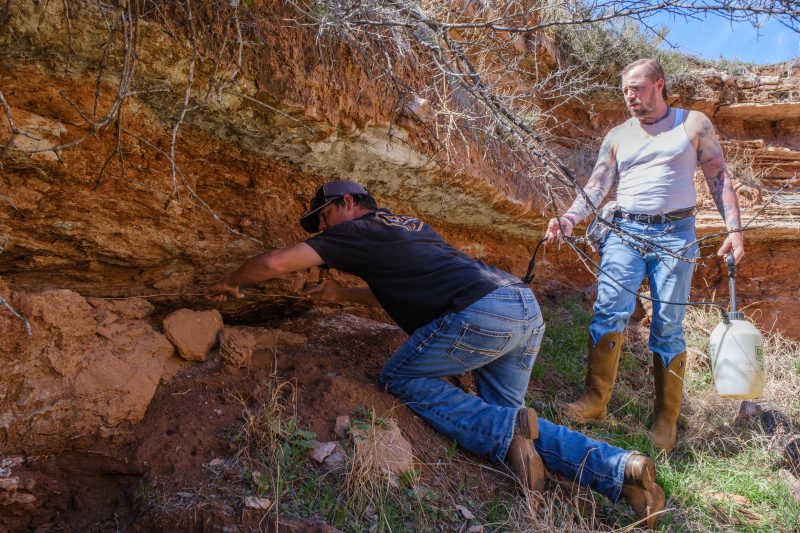
John Browning, left, and Chad Engelbarts gas a snake den with a home brew apparatus to flush out any rattlesnakes that could be in the den. Browning inserted a long pipe into the den, then Engelbarts pumped gasoline through the pipe with the fumes forcing any snakes inside to the opening for air where they could then be captured. Ry Olszewski/Reporting Texas
He opened the lid on a rectangular wooden box, using a long metal hook, he pulled out a large rattlesnake. A loud rattle accompanied his demonstration as he explained the best way to grab a rattlesnake to the novice snake hunters.
The group was guided down into a small canyon, stopping once they reached the canyon ledge. One man held a container of gasoline while another man slid a thin copper tube into the crack under the ledge. He pumped the gas into the snake den through the tube. “We spray a little fume in there, a little fine mist, and it’s kind of like someone coming into your house and opening up a gas can. It’s probably gonna drive you out,” Browning said.
“It’s not illegal, it’s kind of frowned upon by some, but it’s kind of like, in Texas, we also hunt under deer feeders,” Browning said. (Several states regulate snake roundups but not Texas.)
During the first two hours of the guided hunting trip, participants caught two rattlesnakes.
The use of gasoline during snake hunts is harmful to other animals, according to a 2016 Texas Parks and Wildlife report. “There are better options for collecting snakes that do not adversely impact non-target species,” the report states.
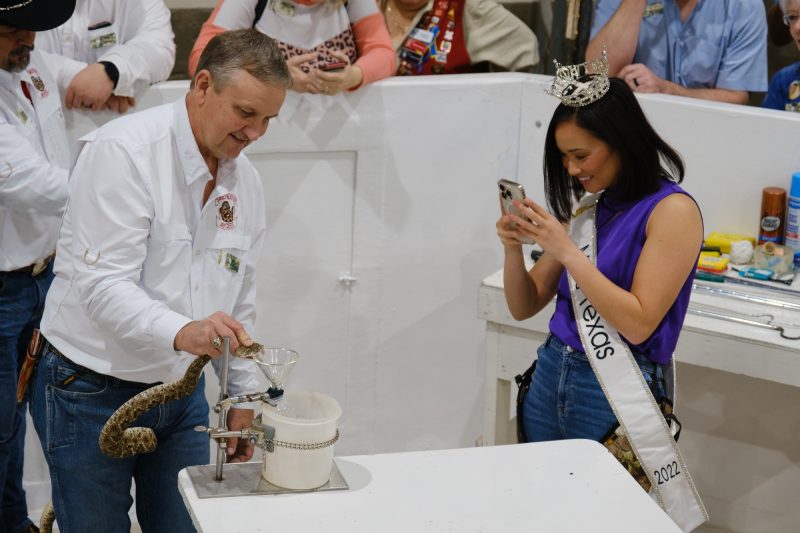
Miss Texas Averie Bishop records a video of Sweetwater Jaycee Dennis Cumbie milking a rattlesnake’s venom which is sold for research. Ry Olszewski/Reporting Texas
Once captured, rattlesnakes are brought to the coliseum where they are weighed, measured and their venom milked before they are beheaded and skinned. The venom is sold for scientific research, Soles said, though he declined to give specific details.
The Jaycees sell the head, skin, gallbladder and meat, Soles added.
“We always have some oriental people that show up and say, ‘Hey, I want 500 gallbladders,’” Soles said.
Soles said his adult daughter is a Jaycee and he hopes that she carries on the family tradition of participating in the roundup — which he views as a vital part of Sweetwater — for years to come.
“If you can’t be a productive citizen in society and give back to your community, I mean, what the hell have you done?” Soles said.